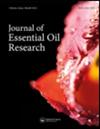Drying kinetics of cinnamon (Cinnamomum zeylanicum J. Presl) leaves: effects on individual volatile compounds and external color
IF 2.1
3区 农林科学
Q3 CHEMISTRY, APPLIED
引用次数: 0
Abstract
ABSTRACT The post-harvest stage of crops aims to minimize losses occuring during storage and commercialization. Drying process are some of the most used methods to minimize those losses. This work aimed at studying the drying kinetics of cinnamon (Cinnamomum zeylanicum), subject to two different drying conditions, one of which in an experimental fixed-bed dryer relying on an ambient air and speed of 0.5 m s−1, and the other with a forced air circulation oven at different temperatures (313.5, 323.15, 333.15 and 343.15 °K). The time required to reach the moisture equilibrium contents was 1.42, 3.0, 6.41, 14.0 and 21 h for drying temperatures of 343.15, 333.15, 323.15, 313.5 and 307.95 ºK, respectively. The Arrhenius equation described the diffusivity’s dependence on temperature, defining the activation energy of 64.77 kJ mol−1. The essential oils of the samples were analyzed through gas chromatography, which identified 23 individual compounds being eugenol the most abundant.肉桂(Cinnamomum zeylanicum J. Presl)叶片的干燥动力学:对单个挥发性化合物和外部颜色的影响
作物收获后阶段的目的是尽量减少储存和商业化过程中发生的损失。干燥过程是一些最常用的方法,以尽量减少这些损失。本研究旨在研究肉桂(Cinnamomum zeylanicum)在两种不同干燥条件下的干燥动力学,一种是在实验固定床干燥机中依赖环境空气和速度为0.5 m s - 1,另一种是在不同温度(313.5,323.15,333.15和343.15°K)的强制空气循环烘箱中。干燥温度为343.15、333.15、323.15、313.5和307.95ºK时,达到水分平衡含量所需时间分别为1.42、3.0、6.41、14.0和21 h。Arrhenius方程描述了扩散率与温度的关系,定义了活化能为64.77 kJ mol−1。通过气相色谱法对样品精油进行分析,鉴定出丁香酚含量最高的化合物有23种。
本文章由计算机程序翻译,如有差异,请以英文原文为准。
求助全文
约1分钟内获得全文
求助全文
来源期刊

Journal of Essential Oil Research
工程技术-食品科技
CiteScore
6.00
自引率
3.30%
发文量
52
审稿时长
18-36 weeks
期刊介绍:
Journal of Essential Oil Research ( JEOR) is the major forum for the publication of essential oil research and analysis. Each issue includes studies performed on the chemical composition of some of the 20,000 aromatic plants known in the plant kingdom. JEOR is devoted entirely to all phases of research from every corner of the world by the experts in their field. JEOR''s main areas of focus include:
-Analytical chemistry-
Biological activity-
Biotechnology-
Chemical composition-
Chemical synthesis-
Chemosystematics-
Microbiological activity-
Plant biochemistry/biosynthesis-
Toxicology.
Published six times per year, JEOR provides articles on the aromatic principles of a plant or its isolates and are directed toward furthering our readers'' knowledge of the aromatic plant and animal kingdoms.
 求助内容:
求助内容: 应助结果提醒方式:
应助结果提醒方式:


